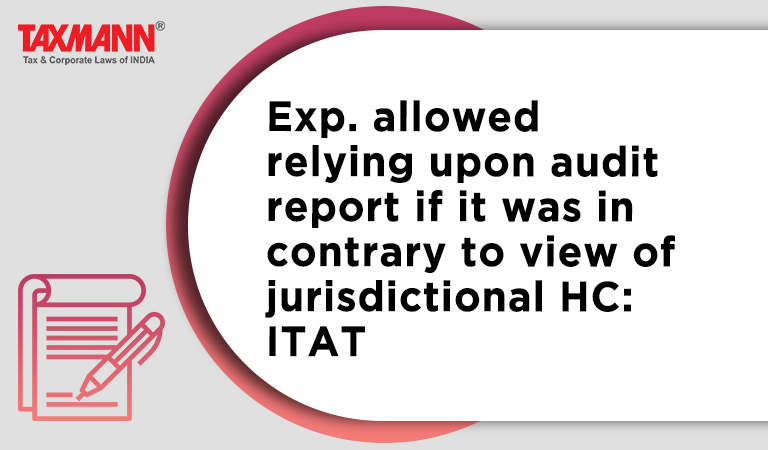Exp. allowed relying upon audit report if it was in contrary to view of jurisdictional HC: ITAT
- Blog|News|Income Tax|
- 2 Min Read
- By Taxmann
- |
- Last Updated on 30 April, 2022

Case Details: Kalpesh Synthetics (P.) Ltd. v. DCIT - [2022] 137 taxmann.com 475 (Mumbai - Trib.)
Judiciary and Counsel Details
-
- Pramod Kumar, Vice-President and Sandeep S. Karhail, Judicial Member
- Bhupendra Shah for the Appellant.
- Dinesh Chourasia for the Respondent.
Facts of the Case
While processing of return, the CPC, Bangalore had proposed some adjustments under section 143(1)(a)(iv) based on disallowance made by the tax auditor in audit report. The assessee objected to the proposed adjustment by relying upon rulings of the jurisdictional High Court. However, CPC rejected the objections and passed the order.
The assessee carried the matter in appeal before the CIT(A) but without any success. It filed an instant appeal before the Mumbai Tribunal.
ITAT Held
The Mumbai Tribunal held that section 143(1)(a)(iv) specifically provides for an adjustment in respect of “disallowance of expenditure indicated in the audit report but not taken into account in computing the total income in the return”. It does proceed on the basis that when a tax auditor indicates a disallowance in the tax audit report, for this indication alone, the expense must be disallowed while processing under section 143(1) by the CPC.
The tax auditor is a third party, and his opinions cannot bind the auditee in any manner. As a matter of fact, no matter how highly placed an auditor is, and even within the Government mechanism and with respect to CAG audits, the audit observations are seldom taken an accepted position by the auditee- even when the auditor is appointed by the auditee himself.
When the law enacted by the legislature has been construed in a particular manner by the Hon’ble jurisdictional High Court, it cannot be open to anyone in the jurisdiction of that Hon’ble High Court to read it in any other manner than as read by the Hon’ble jurisdictional High Court.
The views expressed by the tax auditor cannot be reason enough to disregard the binding views of the Hon’ble jurisdictional High Court. Thus, to that extent, the provisions of Section 143(1)(a)(iv) must be read down.
Thus, the contrary view law laid down by jurisdictional Hon’ble Courts must be taken care of while making adjustments under section 143(1)(a)(iv).
Disclaimer: The content/information published on the website is only for general information of the user and shall not be construed as legal advice. While the Taxmann has exercised reasonable efforts to ensure the veracity of information/content published, Taxmann shall be under no liability in any manner whatsoever for incorrect information, if any.

Taxmann Publications has a dedicated in-house Research & Editorial Team. This team consists of a team of Chartered Accountants, Company Secretaries, and Lawyers. This team works under the guidance and supervision of editor-in-chief Mr Rakesh Bhargava.
The Research and Editorial Team is responsible for developing reliable and accurate content for the readers. The team follows the six-sigma approach to achieve the benchmark of zero error in its publications and research platforms. The team ensures that the following publication guidelines are thoroughly followed while developing the content:
- The statutory material is obtained only from the authorized and reliable sources
- All the latest developments in the judicial and legislative fields are covered
- Prepare the analytical write-ups on current, controversial, and important issues to help the readers to understand the concept and its implications
- Every content published by Taxmann is complete, accurate and lucid
- All evidence-based statements are supported with proper reference to Section, Circular No., Notification No. or citations
- The golden rules of grammar, style and consistency are thoroughly followed
- Font and size that’s easy to read and remain consistent across all imprint and digital publications are applied



 CA | CS | CMA
CA | CS | CMA
